
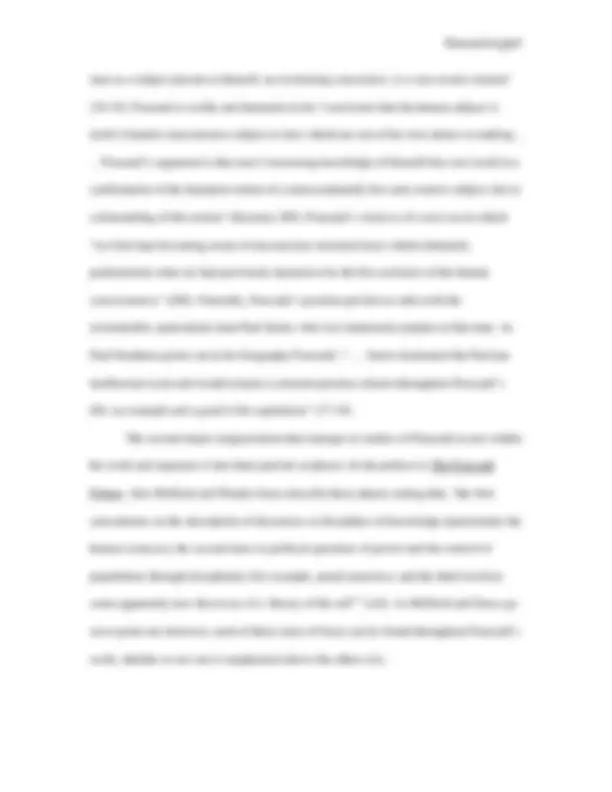
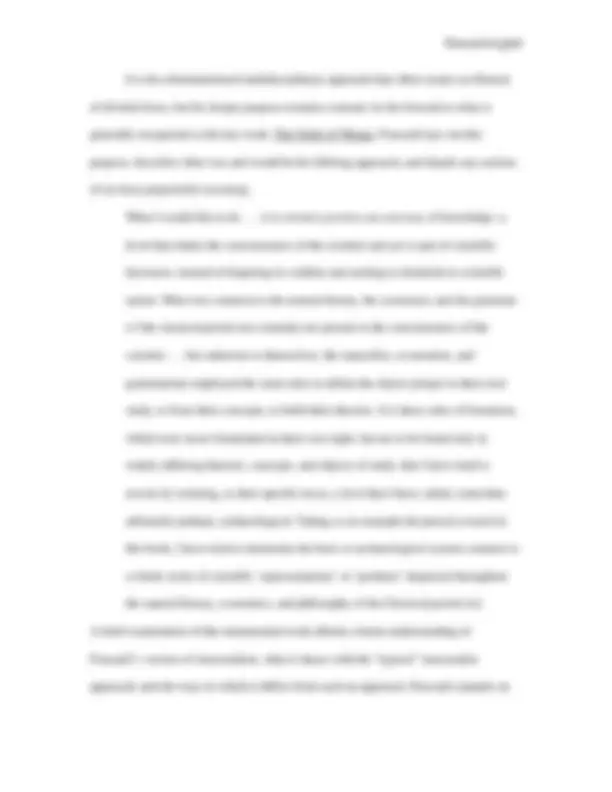
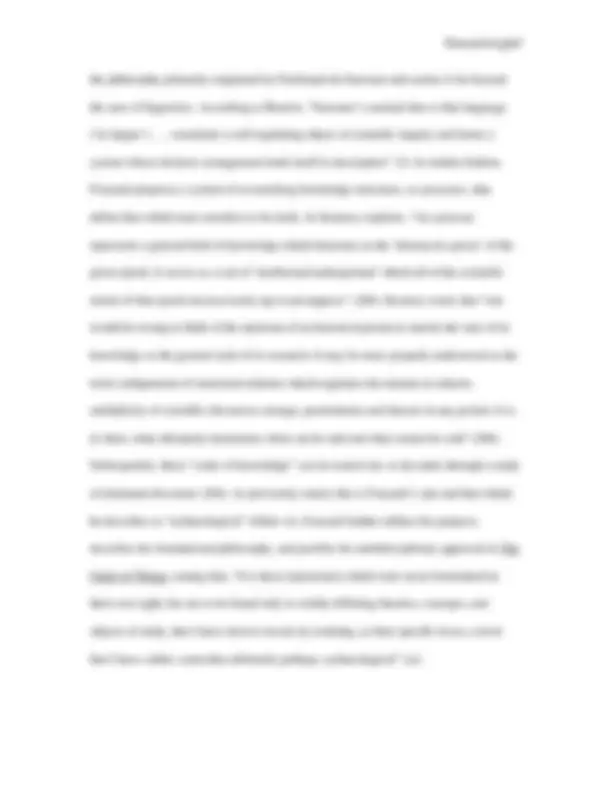
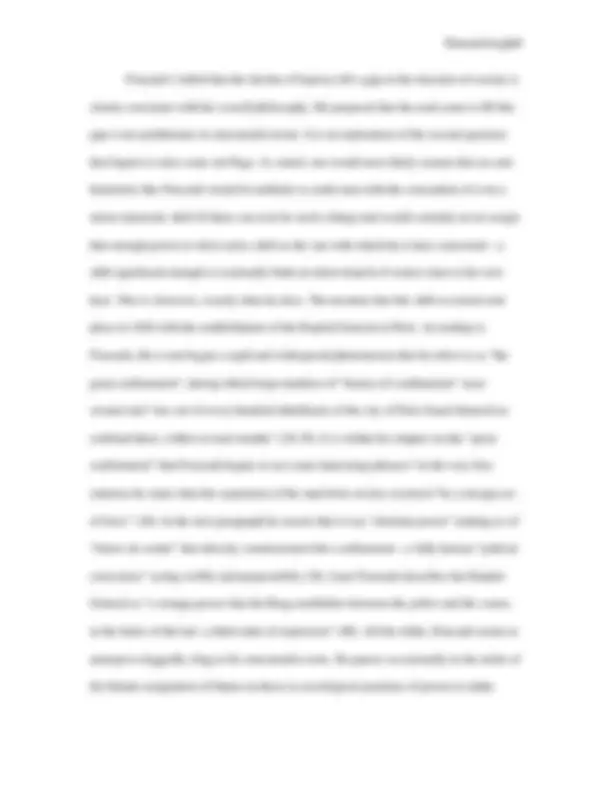
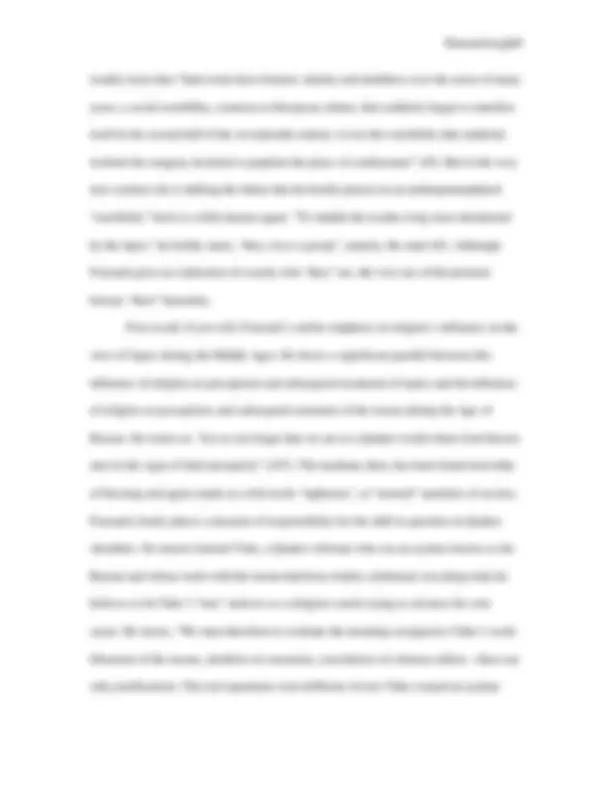
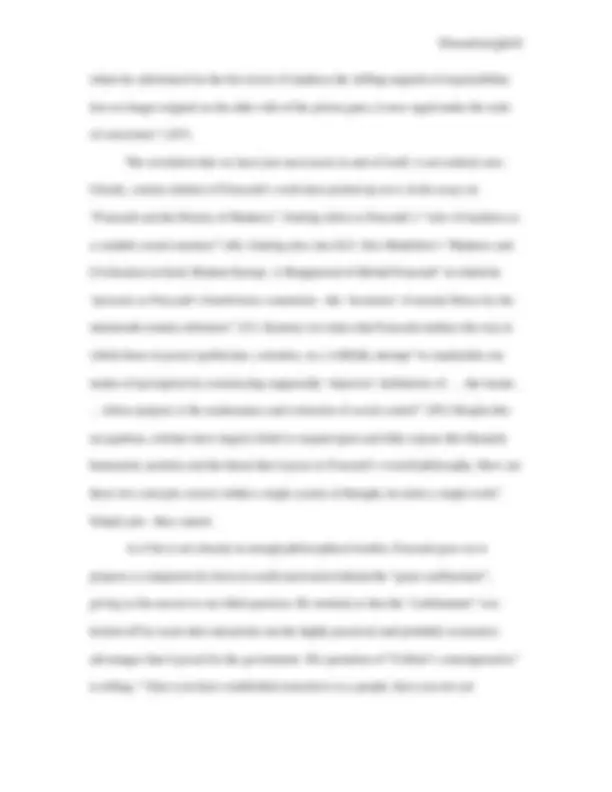
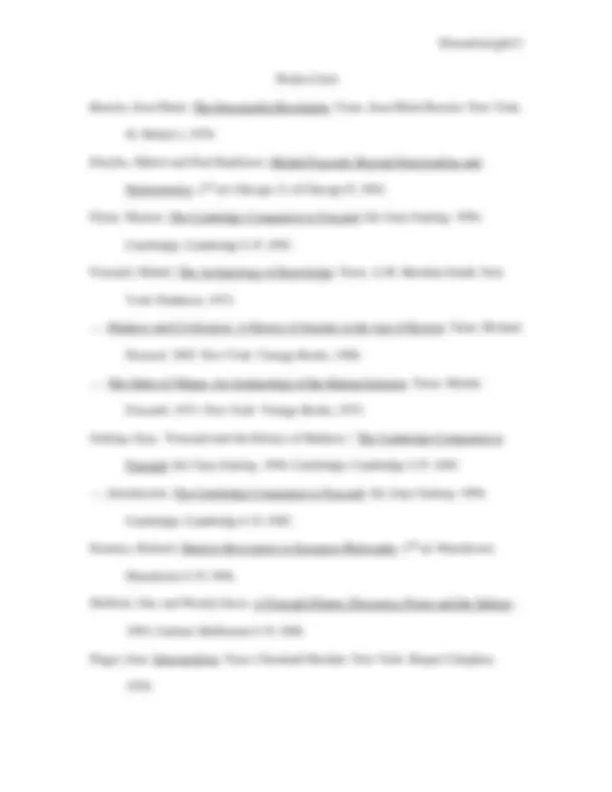



Study with the several resources on Docsity

Earn points by helping other students or get them with a premium plan


Prepare for your exams
Study with the several resources on Docsity

Earn points to download
Earn points by helping other students or get them with a premium plan
Community
Ask the community for help and clear up your study doubts
Discover the best universities in your country according to Docsity users
Free resources
Download our free guides on studying techniques, anxiety management strategies, and thesis advice from Docsity tutors
Material Type: Paper; Class: Advanced Communication Theory; Subject: Comm - Comm Studies (graduate); University: Regent University; Term: Fall 2002;
Typology: Papers
1 / 14

This page cannot be seen from the preview
Don't miss anything!









Gayle Himmelwright 1 December 2002 COM 705 Closet Existentialist: Paul-Michel Foucault’s Unexplored Existentialist Leanings Paul-Michel Foucault, one of the most visible, influential, and difficult philosophers of the 20the century, produced a vast body of work, delving into a broad range of subjects, and influencing modern thought in a number of fields outside of pure philosophy. Although Foucault is generally considered a structuralist in his overall philosophy, a close reading of his first major work, Madness and Civilization, reveals a solidly anti-structuralist bent. In this paper, I will present a brief overview of Foucault’s life, his major works, and his major philosophy revealed therein. I will then delve into Madness and Civilization and attempt to illuminate the humanist existentialist elements that I have proposed it contains. Finally, I will offer a few suggestions as to why this philosophical dichotomy exists within Foucault’s work. Michel Foucault was born in Poitiers, France in 1936 and received his education from the best schools in the country, completing advanced degrees in both philosophy and psychology. Throughout his life Foucault held numerous professorial positions at major universities in both Europe and America and traveled extensively, giving lectures across the globe (Gutting xi-xii). Foucault’s work is incredibly divers in its subject matter, reflecting his background in psychology and his interest and involvement in social issues and reaching beyond “standard” philosophical questions to deal with such concepts as madness, physical illness, homosexuality, and politics (Kearney 283). He has, at times, been described as a historian of sorts because his inquiry is so often historical in
nature, but he remains “first and foremost a philosopher” who uses history as a tool to trace those lines of thinking that come to make up that which modern scholars recognize as philosophy and to develop and illuminate his own ontology (McHoul and Grace viii). It is, perhaps, this obvious diversity in both interest and approach that makes Foucault’s work rather difficult to classify, organize, or even fully understand. As Gary Gutting points out in his introduction to The Cambridge Companion to Foucault, Foucault’s “writings are typical of a modernist author in their demand for interpretation” (1). Interpretation of Foucault’s work, according to Gutting, means “finding a unifying schema through which we can make overall sense of [his work]” (1). Although, Gutting admits, such categorization of Foucault’s ideas can be dangerous in its potential to distort, it is at the same time necessary (2). In the majority of discussions of Foucault, two of these categorizations emerge as most typical and most widely accepted. The first is his inclusion in the structuralist tradition. Although many scholars have some trouble labeling Foucault a structuralist— and indeed Foucault himself sporadically complained about being “labeled” in such a way—a general survey of his philosophy reveals a largely structuralist approach. Certainly, as Richard Kearney asserts in Modern Movements in European Philosophy, “Foucault’s use of ‘structuralist’ methods was never what might bwe described as purist,” however his “multidisciplinary approach” still primarily included just that: a “use of ‘structuralist’ methods” (283). Foucault is most obviously a structuralist in his anti- humanism. Jean-Marie Benoist’s The Structural Revolution points to Foucault’s epistemology as a key force in the promotion of the “death of man” movement. Foucault, he argues, rises up against the popular existentialist viewpoint to “show that the notion of
It is his aforementioned multidisciplinary approach that often creates an illusion of divided focus, but his deeper purpose remains constant. In the forward to what is generally recognized as his key work, The Order of Things, Foucault lays out this purpose, describes what was and would be his lifelong approach, and dispels any notions of (at least purposeful) wavering: What I would like to do... is to reveal a positive unconscious of knowledge: a level that eludes the consciousness of the scientist and yet is part of scientific discourse, instead of disputing its validity and seeking to diminish its scientific nature. What was common to the natural history, the economics and the grammar o f the classical period was certainly not present to the consciousness of the scientist... but unknown to themselves, the naturalists, economists, and grammarians employed the same rules to define the objects proper to their own study, to form their concepts, to build their theories. It is these rules of formation, which were never formulated in their own right, but are to be found only in widely differing theories, concepts, and objects of study, that I have tried to reveal, by isolating, as their specific locus, a level that I have called, somewhat arbitrarily perhaps, archaeological. Taking as an example the period covered in this book, I have tried to determine the basis or archaeological system common to a whole series of scientific ‘representations’ or ‘products’ dispersed throughout the natural history, economics, and philosophy of the Classical period (xi). A brief examination of this monumental work affords a better understanding of Foucault’s version of structuralism, what it shares with the “typical” structuralist approach, and the ways in which it differs from such an approach. Foucault expands on
the philosophy primarily originated by Ferdinand de Saussure and carries it far beyond the area of linguistics. According to Benoist, “Saussure’s seminal idea is that language (‘la langue’)... constitutes a self-regulating object of scientific inquiry and forms a system whose intrinsic arrangement lends itself to description” (3). In similar fashion, Foucault proposes a system of overarching knowledge structures, or epistemes , that define that which man considers to be truth. As Kearney explains, “An episteme represents a general field of knowledge which functions as the ‘historical a priori’ of the given epoch. It serves as a sort of ‘intellectual underground’ which all of the scientific minds of that epoch unconsciously tap or presuppose” (286). Kearney warns that “one would be wrong to think of the episteme of an historical period as merely the sum of its knowledge or the general style of its research. It may be more properly understood as the total configuration of structural relations which regulates the manner in which a multiplicity of scientific discourses emerge, predominate and interact in any period. It is, in short, what ultimately determines what can be said and what cannot be said” (286). Subsequently, these “codes of knowledge” can be rooted out, or decoded, through a study of dominant discourse (284). As previously stated, this is Foucault’s aim and that which he describes as “archaeological” (Order xi). Foucault further defines his purpose, describes his foundational philosophy, and justifies his multidisciplinary approach in The Order of Things, stating that, “It is these [epistemes] which were never formulated in their own right, but are to be found only in widely differing theories, concepts, and objects of study, that I have tried to reveal, by isolating, as their specific locus, a level that I have called, somewhat arbitrarily perhaps, archaeological” (xi).
of free society until the Age of Reason when a sudden shift took place that forever changed the perception of madness. In order to fully understand the work itself, and in order to fulfill the broader objective laid out in this paper, we must search for the answers to three key questions. First, what caused this sudden shift? Second, who (surprising, perhaps, Foucault does give us a who) caused this sudden shift? Third, why exactly was it initiated? The first question is the simplest and is typically addressed in any summary/review of the work. According to Foucault, for centuries leprosy was quite common. The leper, he believes, played a key role in society. In his necessary isolation, the leper was symbolic, particularly in a religious sense, to a European society whoe every aspect was greatly influenced by religion. He was, Foucault suggests, “a constant manifestation of God, since [he] was a sign both of His anger and of His grace” (Madness 6). This was a strange but important dichotomy. For mankind of the Middle Ages, the concept of God’s wrath in the face of sin was constantly reinforced in his “obvious” visible punishment of the sins of the leper. Surely the non-leprous could not fail to consciously or unconsciously draw comparisons among themselves and these unfortunate outcasts, drawing at least some measure of pride and comfort in the fact that their health denoted an antithetical level of virtue and normalcy. At the same time, this same punishment was evidence that God was, in His grace, still mindful of man—so much so that he bothered to deal with his sin through leprosy (6). Although Foucault does not concentrate too much on the role of religion in society’s view of leprosy, the concept should not be underestimated in its importance as it is later developed extensively in his discussion madness.
Foucault’s belief that the decline of leprosy left a gap in the structure of society is clearly consistent with his overall philosophy. His proposal that the mad came to fill this gap is not problematic in structuralist terms. It is an exploration of the second question that begins to raise some red flags. As stated, one would most likely assume that an anti- humanists like Foucault would be unlikely to credit man with the conception of even a minor epistemic shift (if there can even be such a thing) and would certainly never assign him enough power to elicit such a shift as the one with which he is here concerned—a shift significant enough to eventually birth an entire branch of science dear to his own hear. This is, however, exactly what he does. The moment that this shift occurred took place in 1656 with the establishment of the Hopital General in Paris. According to Foucault, this event began a rapid and widespread phenomenon that he refers to as “the great confinement”, during which large numbers of “houses of confinement” were created and “one out of every hundred inhabitants of the city of Paris found themselves confined there, within several months” (38-39). It is within his chapter on this “great confinement” that Foucault begins to use some interesting phrases> In the very first sentence he states that this separation of the mad from society occurred “by a strange act of force” (38). In the next paragraph he asserts that it was “absolute power” making us of “letters de cachet” that directly commissioned this confinement—a fully human “judicial conscience” acting swiftly and purposefully (38). Later Foucault describes the Hopital General as “a strange power that the King establishes between the police and the courts, at the limits of the law: a third order of repression” (40). All the while, Foucault seems to attempt to doggedly cling to his structuralist roots. He pauses occasionally in the midst of his blatant assignation of blame on those in sociological positions of power to rather
where he substituted for the free terror of madness the stifling anguish of responsibility; fear no longer reigned on the other side of the prison gates, it now raged under the seals of conscience” (247). The revelation that we have just uncovered, in and of itself, is not entirely new. Clearly, certain scholars of Foucault’s work have picked up on it. In his essay on “Foucault and the History of Madness”, Gutting refers to Foucault’s “view of madness as a variable social construct” (48). Gutting also cites H.C. Eric Medelfort’s “Madness and Civilization in Early Modern Europe: A Reappraisal of Michel Foucault” in which he “presents as Foucault’s fourth basic contention—the ‘invention’ of mental illness by the nineteenth-century reformers” (51). Kearney too states that Foucault outlines the way in which those in power (politicians, scientists, etc.) willfully attempt “to standardize our modes of perception by constructing supposedly ‘objective’ definitions of... the insane.
.. whose purpose is the maintenance and extension of social control” (291) Despite this recognition, scholars have largely failed to expand upon and fully expose this blatantly humanistic position and the threat that it poses to Foucault’s overall philosophy. How can these two concepts coexist within a single system of thought, let alone a single work? Simply put—they cannot. As if he is not already in enough philosophical trouble, Foucault goes on to propose a comparatively down-to-earth motivation behind the “great confinement”, giving us the answer to our third question. He reminds us that the “confinement” was kicked off by royal edict and points out the highly practical (and probably economic) advantages that it posed for the government. His quotation of “Colbert’s contemporaries” is telling: “’Since you have established yourselves as a people, have you not yet
discovered the secret of forcing all the rich to make all the poor work’” (Madness 46)? His sarcasm is almost audible in his insistence that, “Before having the medical meaning we give it, or that at least we like to suppose it has, confinement was required by something quite different from any concern with curing the sick. What made it necessary was an imperative of labor. Our philanthropy prefers to recognize the signs of a benevolence toward sickness where there is only a condemnation of idleness” (46). Additionally, as has been stated already, the (particularly Quaker) religious powers used the mad as they once used the lepers, as proof of the existence of God, His wrath toward sinners, and their obvious righteousness and authority (247). Now that we have uncovered this distinct contradiction between Foucault’s philosophy and interpretation of social history, one final question arises: why does Foucault, a brilliant scholar, clearly capable of grasping and synthesizing a much broader range of information that I could ever hope to, allow such a gigantic slip to occur in his work? Although it will never be possible to answer this question completely, a glimpse into his personal life may offer some insight. As Strathern reveals, Foucault’s was by no means a “normal” or easy life. He drank heavily, participated in all kinds of sexual experimentation and promiscuity, and eventually contracted AIDS. As a homosexual, as, for a time, a Marxist, as an anti-Sartrean, and as a radical proponent of social reform (1- 76), Foucault was always on the fringe. It is obvious he had a subsequent personal affinity for others who shared a similar position and whom he saw as oppressed, such as the mad, women, prisoners, and others (Kearney 283). His sympathy for those that have been labeled “mad” is apparent throughout Madness and Civilization. Madness, he states, “is closer to happiness and truth than reason... closer to reason than reason itself.. .”
Works Cited Benoist, Jean-Marie. The Structuralist Revolution. Trans. Jean-Marie Benoist. New York, St. Martin’s, 1978. Dreyfus, Hubert and Paul Raabinow. Michel Foucault: Beyond Structuralism and Hermeneutics. 2nd^ ed. Chicago: U of Chicago P, 1983. Flynn, Thomas. The Cambridge Companion to Foucault. Ed. Gary Gutting. 1994. Cambridge: Cambridge U P, 1995. Foucault, Michel. The Archaeology of Knowledge. Trans. A.M. Sheridan Smith. New York: Pantheon, 1972. ---. Madness and Civilization: A History of Insanity in the Age of Reason. Trans. Richard Howard. 1965. New York: Vintage Books, 1988. ---. The Order of Things: An Archaeology of the Human Sciences. Trans. Michel Foucault. 1971. New York: Vintage Books, 1973. Gutting, Gary. “Foucault and the History of Madness.” The Cambridge Companion to Foucault. Ed. Gary Gutting. 1994. Cambridge: Cambridge U P, 1995. ---. Introduction. The Cambridge Companion to Foucault. Ed. Gary Gutting. 1994. Cambridge: Cambridge U P, 1995. Kearney, Richard. Modern Movements in European Philosophy. 2nd^ ed. Manchester: Manchester U P, 1994. McHoul, Alec and Wendy Grace. A Foucault Primer: Discourse, Power and the Subject.
Sheridan, Alan. Michel Foucault: The Will to Truth. 1980. London, Tavistock, 1986. Strathern, Paul. Foucault in 90 Minutes. Chicago: Ivan R. Dee, 2000.